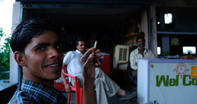Cigarettes and Coke
Cornelia, a resident at the Sonskynhoekie informal camp, pauses mid-conversation. ‘I can smoke, surely?’ She slips another Remington Gold from the dark-blue pack on the table in front of her. Cigarettes and Coke. Her two big addictions. ‘Ja, I smoke a lot.

Two boxes a day.’ And if she does not get her fix? ‘Oooooh, ek raak baie upset. Jy moenie met my praat nie. Ek vloek!’ she cackles at herself. (‘Oooooh, I get very upset. You mustn’t talk to me.
I’ll swear!’ she cackles at herself). It seems surprising that cash-strapped households would allocate even a part of what little they have to what seems like the non-essentials.
But we need more than just food to live – we need a sense of connectedness, we need to play occasionally and we have our own addictions. Which is why you will find even the most hard-up still finding a way to get hold of cigarettes, alcohol, cell phone airtime.
Status More Important than Nutrition

The Siyakhana Initiative for Ecological Health and Food Security, based at the University of the Witwatersrand’s Medical School at the time, decided to do a year-long study into the food security status of students on campus, which included looking at people’s spending patterns.
The programme coordinator at the time, Anri Landman, said students had approached the unit, saying that some of their friends would not go to lectures in the final week of each month, ahead of their next financial aid payout. Their reasoning, Landman explains, was that they did not have money for food and struggled to concentrate in class.
Even before the final results came in, it became clear that some students would choose airtime or bottled water over food because status was often more important than eating or getting a nutritious meal, explains Landman. This was confirmed when, after a year of following students’ spending patterns, a few clear trends emerged.
‘Students would often choose status foods such as coffee, muffins or bottled water to be part of the popular group on campus,’ says Landman. After paying for necessities like accommodation, transport and food, students spent their money on clothes, airtime, socialising (not alcohol, though, but rather going to the movies and that sort of thing) and stationery.
‘We didn’t ask questions to determine if they would sometimes buy these things before they bought food, but in the focus group discussions, students said that they would sometimes buy stationery before food.
They also explained that they would buy their food based on price; in other words, they’d buy the cheapest food option, which almost always compromised on the meal’s nutritional value.’ Many would do this because they simply did not have enough money, but it could also be because they prioritised other expenditures over more expensive food, although another round of research will be necessary to try to understand why this is so.
But when it comes to food and nutrition, maybe this is where the body fails itself. It is easy to fill the hole in your stomach, to appease the body’s need to bump up the blood sugar and drive out the immediate discomfort of hunger, without giving the body the nutrients it needs.
Meeting Other Needs
The body’s cues to appease hunger are finely tuned and potent when they are triggered. But it is not like that for long-term nutrition. So when someone has to make a decision, now, about how to split up her budget today, it is easy to drive off feelings of hunger with a packet of chips or a can of Coke, and leave some extra money to meet other needs – whether it be a nicotine addiction, or the very real need for social connectivity, or status even, which cellphones provide.
As if on cue, a woman who has been sweeping the compacted dirt apron around Cornelia’s tin shack appears, carrying a pronounced limp and a straw broom, and waiting for an opening. She is done for the day, she says softly, almost apologetically, her voice labouring through her pronounced r’s that rumble like a car rattling across corrugations in a road. Can she go, please?
Cornelia’s chemical-orange head bobs, and she is discharged, but not before she pops a glass of Coke down on the table in front of her boss. She is family of the camp owners, the Duvenhages, but lives in one of the Wendys with the rest of the squatters. She cleans for Cornelia in exchange for a packet of cigarettes a day, and an extra R20 on the days when there is laundry to be done.
By Leonie Joubert